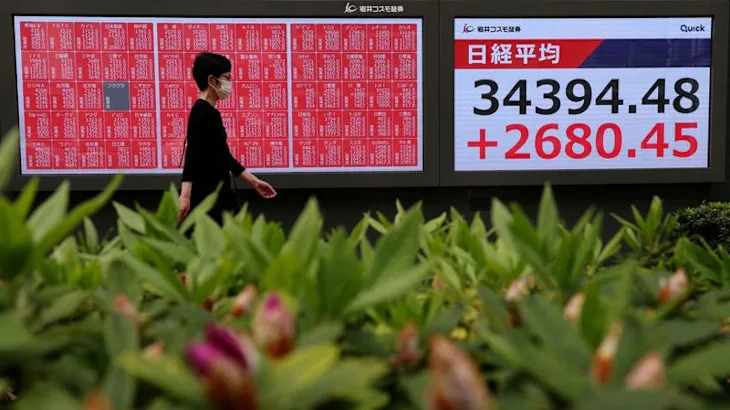
Stocks soar in relief rally after Trump pauses tariffs
By Rae Wee
SINGAPORE (Reuters) - Global shares surged and a manic bond selloff stabilised on Thursday after U.S. President Donald Trump said he would temporarily lower the hefty duties he had just imposed on dozens of countries.
However, the sharp overnight rally in U.S. stocks and the dollar lost steam as a trade war between the United States and China ratcheted up, with investors also perplexed over the flip-flopping of the Trump administration's tariff plans.
Following a days-long market rout that erased trillions of dollars from global stocks and jolted U.S. Treasury bonds and the dollar, Trump on Wednesday announced a 90-day pause on many of his new tariffs in a shock reversal.
That pushed European futures up sharply in the Asian session, with EUROSTOXX 50 futures and DAX futures climbing nearly 8% each, while FTSE futures gained 5.4%.
Japan's Nikkei similarly advanced more than 8%.
But Wall Street took a breather after a towering rally overnight, as investors struggled to come to terms with the U.S. administration's economic policies.
"The world, political and financial is looking on with horror, not bemusement, at an administration that prioritises the signing of an executive order for more water-power in shower heads, on the same day that the bond market breaks and investors question the long-term credibility of the administration having flip-flopped on the largest of their policies, tariffs," said Martin Whetton, head of financial markets strategy at Westpac.
Nasdaq futures fell more than 1% and S&P 500 futures were off 0.8%.
Both indexes had clocked their biggest daily percentage gains in more than a decade during Wednesday's cash session.
The dollar fell 0.8% against the yen and 0.6% on the Swiss franc, failing to sustain its jump against the two safe haven currencies in the previous session. [FRX/]
"I think the initial move was just massive short cover, and this has given the world a bit of a breathing space, except for China... because markets were starting to price in the worst-case scenario," said Khoon Goh, head of Asia research at ANZ.
"But now that the dust has settled, I think markets will seem to sort of figure out where to go from here."
Trump's reversal on the country-specific tariffs is not absolute. A 10% blanket duty on almost all U.S. imports will remain in effect, the White House said. The announcement also does not appear to affect duties on autos, steel and aluminium that are already in place.
He also heaped pressure on China, saying he would raise the tariff on Chinese imports to 125% from the 104% level that came into effect on Wednesday.